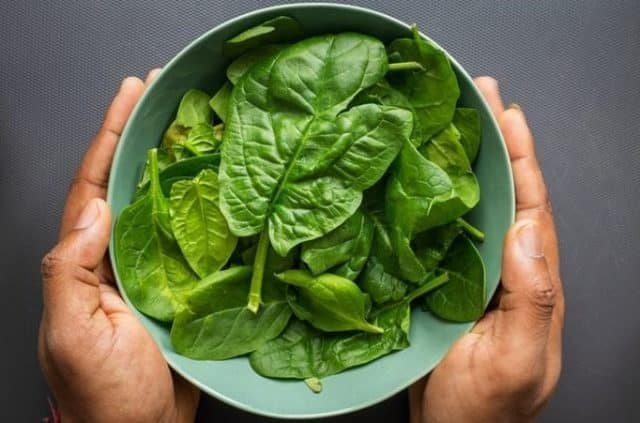
It is common for many pet owners to share their favorite bites with their charming pups. When it is nutritious for us, we might believe that it is also suitable for our pups.
Our pets, though, are different from humans in that they aren’t able to fully benefit from the nutrients some types of food offer to us. One of which is spinach, a controversial veggie to feed our furry pals. Just because it has many health benefits, does not mean that it is entirely harmless for dogs. In some cases, it is true that certain human foods (read more) are toxic to dogs which is why you also have to selective about what treats you let your pets eat.
Furthermore, feeding dogs spinach is certainly a subject that’s open to debate. When it comes to feeding them one, it is generally safe. However, there are some precautions that owners should bear in mind before serving this leafy green to their pets.
This article explores the nutrition in spinach and how it can benefit dogs while also discussing the possible risks of feeding one to your pet.
What Is Spinach?

Like all other leafy green vegetables, spinach is an excellent source of numerous nutrients, including calcium, vitamins, iron, and antioxidants.
It can usually be seen in salads, which can be eaten fresh or after pickling. While eating, you might wonder, can dogs eat spinach as well? Experts say that it won’t hurt to try, and it also won’t hurt even if you don’t try. In other words, while it is edible for canines, they can still get such nutrients from food they normally have.
Spinach typically delivers equal amounts of nutrient power to our canine companions. Though it shouldn’t be your dog’s sole food source, it is still beneficial to incorporate these leaves into your dog’s diet to boost nutrients and fiber. In addition, it is a great food to add to their diet to maintain your dog’s caloric intake to prevent them from getting hungry between meals.
Nutrition Facts 101: Spinach
It contains most of the amazing vitamins and minerals that help with a multitude of benefits. According to the U.S. Department of Agriculture, here are a few of the vitamins included as listed:
- Vitamin A
It is an excellent source of good vision, healthy immunity, and support for cell growth. Also, it is a perfect addition to your pup’s diet to maintain optimal health, which benefits their skin, coat muscles, and nerves. Thus, it will make your dog look great all the time with this vitamin’s excellent aids!
- Vitamin C
Vitamin C is an essential antioxidant that may boost the body’s defense system by absorbing potentially harmful free radicals and effectively reducing inflammation and cognitive aging. Although dogs can synthesize their own vitamin C in their liver, they can still get additional nutrition from consuming spinach.
- Vitamin E
The benefits of vitamin E, the most famous for fat digestion, are not limited to that purpose alone. Vitamin E is additionally essential for maintaining a healthy immune system, promoting good muscle health, supporting a healthy heart, helping maintain good liver and skin health, and keeping skin and coat healthy. In short, most dogs need to get this for the sake of not getting deficiencies.
- Vitamin K
Studies show that eating spinach will provide a large amount of vitamin K, which is essential in maintaining bone marrow health, particularly the ability of the blood to clot normally. It is a great benefactor for your pups as it helps keep a healthy heart with an immune boost.
Cons Of Giving Your Pup A Spinach
Although numerous benefits can be found in spinach, it is not always the case for dogs. Spinach contains a high amount of oxalic acid, which might trouble your dog’s body from absorbing calcium and thus damaging its kidneys. It can be especially dangerous for dogs whose kidneys are already strained.
Is It Safe For Dogs?
Spinach is generally safe, but it should be consumed in moderation. While it’s evident that your dog doesn’t need a lot of spinach to reap all of its health benefits, adding it to their food will significantly increase the amount of fiber as well as vitamins and minerals.
Additionally, dogs are naturally carnivorous, so they do not require to eat this leafy vegetable as part of their eating habit, but it can be good as an addition sometimes (link: https://pets.webmd.com/dogs/features/does-dog-need-veggies#1).
When To Feed
When introducing human foods to your dog’s diet, one of the most important things to remember is to conduct your own research and always speak with your veterinarian. Ensure that your dog does not have any underlying condition that may worsen by adding human foods to their diet. Additionally, some dogs aren’t well-tolerated to spinach since they are oxalate-rich, causing a decline in their stomachs. So have them checked first.
How To Prepare It For Your Pup
If you want to give your pet a bite of this healthy leaf, start by gently steaming spinach. Even though raw veggies are more nutritious and fresher, it would be a hassle for your dog to eat them raw. To make it easier, you can soften it by steaming or boiling it. To avoid losing its nutritional properties, leave it alone and don’t add any spices or additives. After that, you can serve it in a small proportion.
Bon Appétit!
ATTENTION READERS
We See The World From All Sides and Want YOU To Be Fully InformedIn fact, intentional disinformation is a disgraceful scourge in media today. So to assuage any possible errant incorrect information posted herein, we strongly encourage you to seek corroboration from other non-VT sources before forming an educated opinion.
About VT - Policies & Disclosures - Comment Policy



